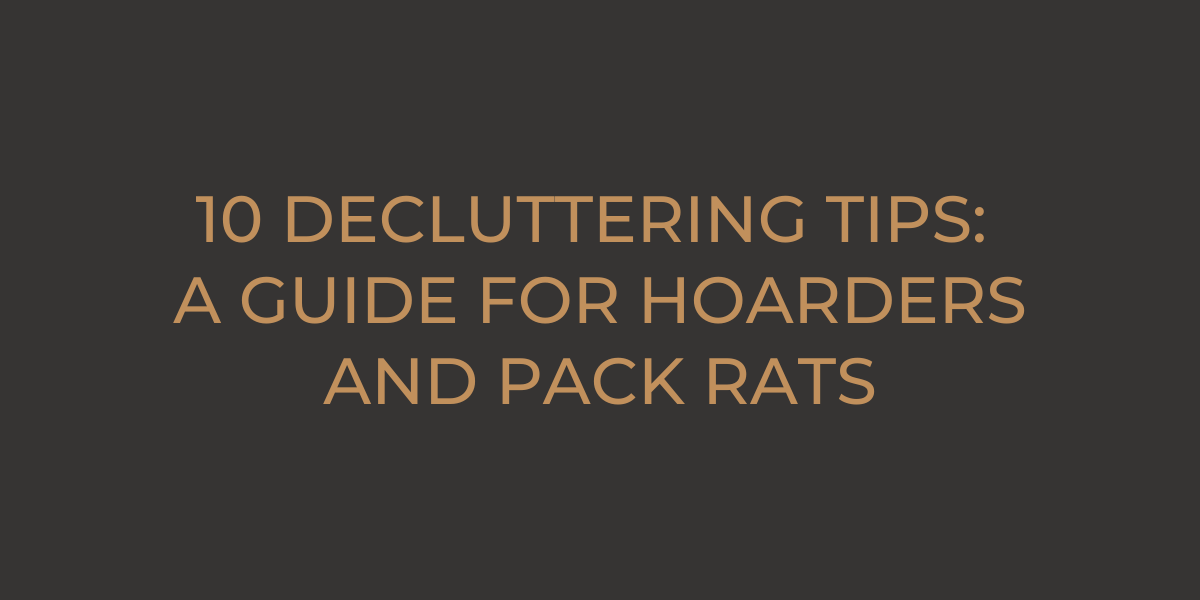When hoarders try to clean up their homes, they often face problems others don’t have. This is because they have highly established routines and emotional ties to their things, often leading to clutter affecting their daily life and health. You need more than just a cleaning spree to get rid of anything. You need a careful, organized plan. This piece is meant to give hoarders actionable tips for removing clutter. The goal is to make space and slowly change how people think about and act with their things. With the right methods and knowledge, it is possible to get over hoarding. In this article, we will learn more about decluttering tips for hoarders.
What is a hoarder?
A hoarder acquires and hoards things without regard for their value or organization, leading to a cluttered living space. Consequences of this sort include risks to health and safety, isolation from friends and family, and perhaps legal trouble. Hoarding is a mental illness classified as Hoarding Disorder, characterized by an individual’s inability to let go of goods despite their lack of utility or value. Therapy or support groups can be helpful in addressing and managing this problem under the guidance of qualified professionals.
How to Know if You Are a Hoarder
It’s not always easy to tell if someone is a hoarder, but here are some indicators:
- Extreme Stockpiling
Extreme stockpiling in hoarding is when individuals acquire and keep large quantities of items, often to the point of excess. These items range from everyday goods like food and toiletries to more unusual objects. The stockpiling often results from a fear of running out or perceived future scarcity. It may also be driven by a desire to feel secure or a belief in the potential usefulness of the items. The stockpiled items often clutter living spaces, making them unusable and sometimes creating health and safety hazards.
- Problems Throwing Away
Hoarders often struggle with discarding items due to strong emotional attachments, perceived future usefulness, and fear of loss. The decision-making process can feel overwhelming, causing distress. This difficulty in parting with possessions, even those of little or no value, leads to excessive clutter that impacts their daily life.
- Messy Home Environments
Hoarders’ homes often become overwhelmed with clutter, leading to messy environments. Items pile up, sometimes floor-to-ceiling, making rooms unusable. The clutter can create health hazards like fire risks or unsanitary conditions. This extreme accumulation negatively impacts the quality of life and can isolate individuals from social interactions.
- Isolation from Others
Hoarders often experience social isolation due to shame or embarrassment about their living conditions. The clutter can make it difficult to invite others over, leading to decreased social activities at home. Additionally, the time and energy spent hoarding can limit interactions, further enhancing isolation.
- Disruption of Normal life
Hoarding can cause significant disruption to normal life. Excessive clutter can render living spaces unusable, hinder day-to-day activities, and create health and safety risks. The time and emotional energy spent on hoarding can also detract from other life areas, including work, relationships, and self-care.
- Struggle with Emotions
Hoarders often struggle with emotions linked to their possessions. They may feel intense anxiety or distress when faced with discarding items. Also, their items can provide comfort, overwhelming the thought of parting with them. This emotional turmoil makes the decluttering method challenging and stressful.
10 Decluttering Tips for Hoarders and Pack Rats
1. Get Started With a Minimal Number
Hoarders might benefit from thinking about the process in terms of smaller, more manageable steps. Begin with a tiny space, like one drawer, countertop, or part of a larger room. Even modest success can increase your self-esteem and encourage you to tackle more difficult tasks.
2. Put Things in the Right Boxes
When cleaning out your home, divide your belongings into piles labeled “Keep,” “Donate,” “Recycle,” and “Trash.” What to do with each object can be determined with the use of this approach.
3. Use the “OHIO” Rule
We recommend that you “Only Handle It Once,” or OHIO. The first time you pick something up, you should decide what to do with it; this guideline will keep you from shuffling junk about instead of getting rid of it.
4. Limit Your Time
Setting a timer can assist reduce the stress associated with decluttering. It’s recommended to begin with 15 minutes, five days a week. As your body adjusts, you can gradually up the number you take.
5. Limit Acquisition
A key part of decluttering is not bringing in more items than you remove. Avoid sales, curb picking, or unnecessary purchases that contribute to the clutter.
6. Create a Decluttering Checklist
Creating a checklist can help you stay focused and give you a sense of accomplishment. List specific areas to declutter and cross them off as you complete them.
7. Utilize Storage Solutions
Effective storage solutions help keep your space tidy. Use shelves, boxes, or baskets to store your belongings. Storage is not about hiding clutter but organizing your necessary items.
8. Use the 12-Month Rule
If you last used an item in the past year, it’s a good candidate for elimination. This rule helps assess the actual usefulness of items.
9. Take Before and After Photos
Visual proof of your progress can motivate you. Take photos before decluttering and after you’ve finished to remind yourself of your progress.
10. Seek Support
It’s okay to ask for help. Involve family or friends, join a support group, or work with a professional organizer. Having support can make the decluttering process less overwhelming and more successful.
How You Can Stop Hoarding
It takes dedication and the correct support system, but overcoming hoarding is possible. The following are some suggestions:
- Acknowledge the Problem
Recognize and acknowledge the detrimental effects your hoarding tendencies have on your life.
- Get in Touch With an Expert
Cognitive Behavioral Therapy (CBT), administered by a qualified mental health practitioner, has been shown to be useful in treating hoarding habits.
- Get Involved in a Support Group
Comfort, a sense of community, and useful advice from those who have been through the same things as you can be found in a support group.
- Establish Realistic Goals
Clearing out a single room is a simple first step. Don’t give up too soon.
- Practice Decision-Making
Deciding what to keep and throw away can help you hone your judgment skills. One approach would be to establish criteria regarding what should be kept.
- Organize and Categorize
Make a plan for how things will be stored and organized. This aids in the suppression of future chaos.
- Keep Making Progress
Preventing relapse requires maintaining healthy routines, such as a weekly decluttering session.
- Consult a Professional Help
They can give individualized advice and hands-on support.
Frequently Asked Questions
What Triggers Hoarding?
Complex emotional and psychological factors often trigger hoarding. It can stem from a deep-seated fear of loss or needing control over one’s environment. Past traumatic events, such as a significant loss or deprivation, can lead to hoarding behavior as a coping mechanism. Additionally, hoarding can be associated with mental health conditions like obsessive-compulsive disorder (OCD), depression, and anxiety. It’s often a response to overwhelming emotions or perceived scarcity, resulting in the excessive accumulation of items. Hoarders may assign sentimental value or potential utility to items, making it difficult for them to discard anything.
The exact triggers can vary widely among individuals, and understanding these triggers is a crucial step in treating hoarding behavior. Professional intervention, such as therapy or support groups, is usually needed to address and manage these underlying triggers effectively.
Why Is It Difficult for Hoarders to Declutter?
Decluttering is difficult for hoarders primarily due to emotional and psychological reasons. They often form strong emotional attachments to their possessions, regardless of their value. Discarding items can stimulate feelings of loss or fear, making the process painful. Hoarders may also struggle with decision-making, finding it overwhelming to decide what to keep or discard. Furthermore, they often perceive items as having potential use or value in the future.
The fear of making a mistake or regretting discarding an item can cause distress. Thus, decluttering goes beyond simple cleaning; it involves confronting deeply ingrained behaviors and emotional responses.
What Are the Inappropriate Things to Avoid Saying to a Hoarder?
Avoid making judgmental or demeaning comments when interacting with a hoarder. Do not say statements like “Just throw it all away” or “Your house is a mess,” as these are dismissive and oversimplify the problem. Not saying things like “You’re just being lazy” or “Why can’t you be normal?” is a good way to avoid humiliation. These remarks are often cruel and useless. Also, don’t provide empty assurances like “If you clean up, your life will be perfect.” Supporting someone with a hoarding disorder requires patience, sensitivity, and understanding because it is a complex mental health condition.
Wrap Up
Hoarders have difficulty removing things, but it’s important for their living situations and mental health. It means recognizing the problem, setting goals that can be reached, and working steadily through the things that have piled up. It’s not just about getting rid of things; it’s also about changing your feelings about what you own. Helping someone feel better emotionally is very important. Regular upkeep can keep things from getting messy again. The journey may be hard, but hoarders can make their homes healthier and more organized with patience, understanding, and consistency.





